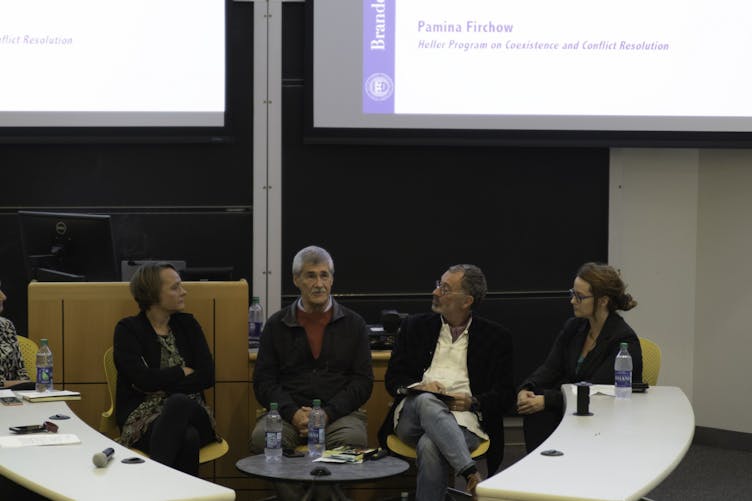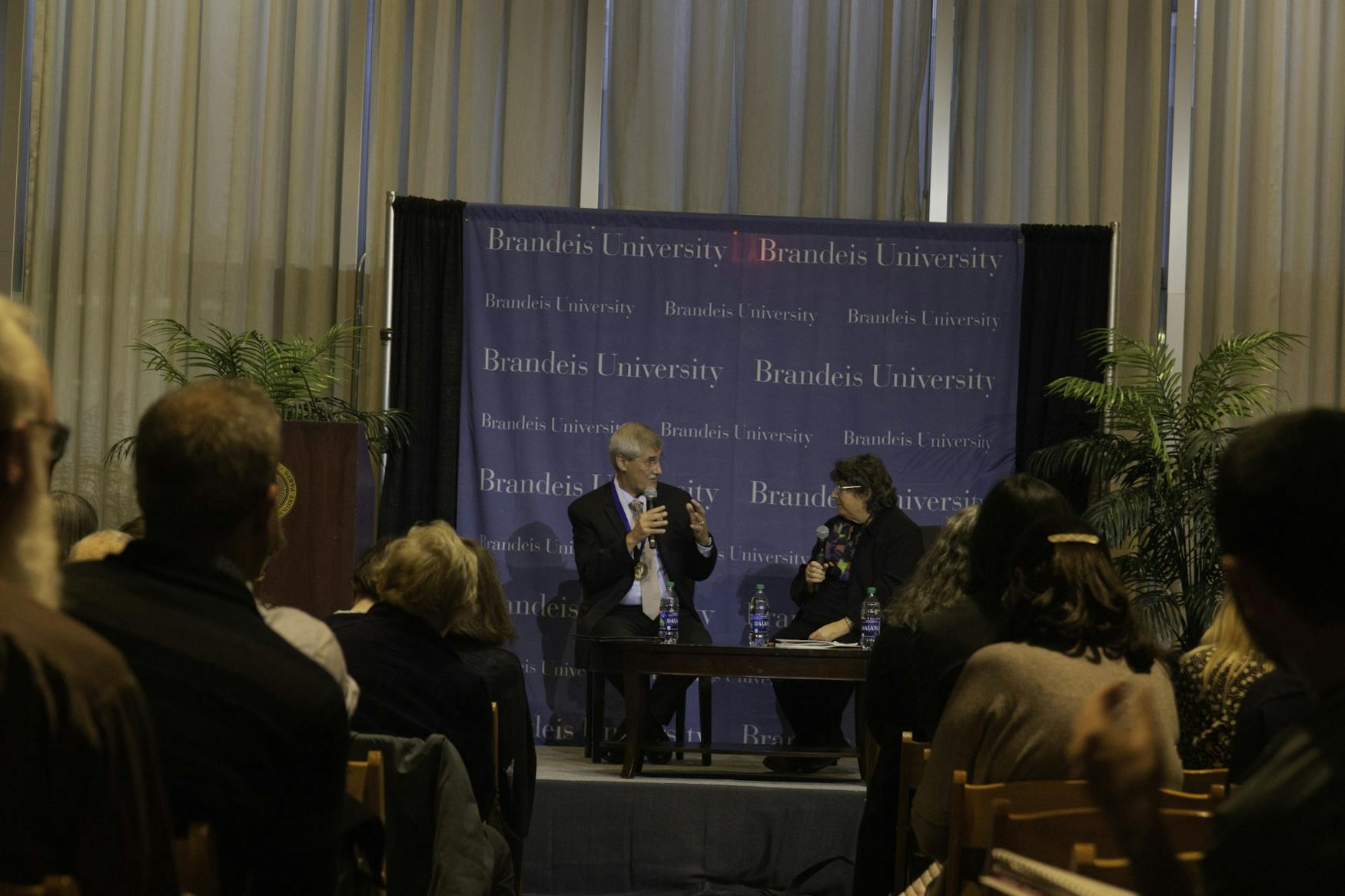University awards 2019 Gittler Prize to notable peacebuilder
The Gittler Prize is awarded to a scholar whose work has contributed to improving cross-cultural relations.
Dr. John Paul Lederach received the 2019 Joseph B. and Toby Gittler Prize on Oct. 30 and gave a lecture entitled “Dispatches from Nowhere Near the Promised Land: How a Peacebuilder Unlearned his Trade.”
Provost Lisa Lynch said during the award ceremony that the selection committee chose Lederach for being “a powerful and insightful scholar whose theoretical construction of such concepts as the moral imagination and peacebuilding work … has influenced a generation of men and women who have brought his thinking to work in some of the world’s most instrumental conflicts.”
The Gittler Prize, Lynch said, “Recognizes an individual who has made an outstanding and lasting scholarly contribution to contributions to racial, ethinic, and/or religious relations.” Lynch explained that the prize was established in 2008 and is funded by contributions from Professor Joseph B. Gittler, honoring both him and his mother, Toby Gittler. It includes a $25,000 prize and is administered by the International Center for Ethics, Justice, and Public Life.
During the lecture, Lederach discussed how he “unlearned” the old approaches to peacebuilding, which, he explained, were damaging to the communities he was helping. Lederach told stories of three trips to Guatemala, Nepal and Nicaragua. In each of these places, he said that he learned more about the “habits of harm” that often come with outside aid, and in that way learned how he needed to reshape the peacebuilding approach.
In Guatemala, Lederach said that he had unintentionally “fallen into the long repeated patterns of imperialism” by using the old approaches to peacebuilding he had been taught. He said this included setting up demonstrations of mediation scenarios, which did not go over well with the local people. He and his colleagues were also there with the notion that they were intervening — they were not there with the goal of forming a meaningful relationship with the community.
In Nepal, he said his experiences taught him more about what it meant to “show up differently,” especially as a philanthropist who ultimately contributes to the conflict by not solving the underlying issues and by treating the local people in a dehumanizing manner. In Nicaragua, Lederach listened to a colleague recite a poem, helping him realize that “peacebuilding is not primarily a labor of social engineering. It is an artistic process that must, over and again, open up what is known, but not seen, and bring into life that which does not exist.”
Lederach conducted a three-day residence from Oct. 29 until Oct. 31, where he delivered presentations on his work as a peacemaker. The panelists for the discussion included COEX faculty Prof. Isabella Jean, Prof. Pamina Firchow, Prof. Ted Johnson, Prof. Sandra Jones and moderator Prof. Alain Lempereur. The Heller School for Social Policy and Management’s Conflict Resolution and Coexistence graduate department held a panel discussion earlier in the day with Lederach entitled “The Evolution of Conflict Transformation.”

Firchow began the panel by introducing Lederach, who is professor emeritus at the Kroc Institute of International Peace Studies at the University of Notre Dame, and was formerly a professor and founding director of the Center for Justice and Peacebuilding at Eastern Mennonite University. She said he “embodies the concept of a pracademic” in his peacebuilding work because he both studies and actively participates in his field.
Firchow also mentioned the most well-known of the 24 books Lederach has written: The Moral Imagination, The Art and Soul of Building Peace, The Little Book of Conflict Transformation, and Building Peace: Sustainable Reconciliation in Divided Societies. She explained that Lederach’s most recent work has been in Colombia, where he is currently serving as a member on the advisory council of the Colombian Truth Commission and as an advisor to the Peace Accords Matrix.
Lederach followed Firchow’s introduction by explaining his role in “the conceptual evolution of conflict transformation.” Lederach spoke about his first visit to Central America in the early 1980s ,where there was much conflict due to three civil wars. He said he was working with community leaders on a proposal for a “conflict resolution commission” or a “multi-leader commission around developing the capacity to understand and respond to conflict.”
Lederach’s proposal, however, was initially met with skepticism because the group was worried that it would not actually change anything, he said. Lederach said the response was, “What exactly do you mean by resolution? … Because if by resolution you mean that you will come here and solve our problems without changing anything, we’re not interested.” This line of questioning, he explained, arose from the fear that the problem would only be resolved on the surface without paying attention to the deeply-rooted issues or to the country’s relationship with aid relief, as had been the case in the past.
Lederach said that in terms of conflict resolution, he is always asking a version of the question “What’s changing here?” He said he focuses on the deeper level of conflicts that others in his field generally do not, looking for solutions and historical patterns that will help him get closer to the root of the conflict. Lederach added that the “evolution [of conflict transformation] was in part a reconfiguration that began to open up the categories … in the 1970s, there was not a category called ‘peacebuilding.’”
Lederach explained that it was hard for people in his generation to see conflict resolution as anything but “delivering aid to people that were suffering,” and there was no consideration of the consequences of aid and underlying conflict on the country’s future. He said he wanted to “open up the notion that your aid might, in fact, be a part of a bigger pattern that’s actually reproducing the things that you’re trying to reduce,” and the idea that peacebuilding is a “relationship-centered venture.”
Lempereur posed the final faculty question, asking Lederach about what he learned in the field. Lederach explained that for a peacebuilder, “in the field” means you are working in someone’s home. He said that he found a “generosity of spirit” on his trips, realizing that “the settings of greatest challenge were also settings that often offered the greatest compassion.” Lederach said he found people who were willing to mobilize due to compassion, despite being in extreme and inadequate living circumstances.
Lederach said he is currently working with Humanity United. As a philanthropist, he said he wants to avoid “abusive patterns” that have emerged in the past under the guise of philanthropy work, such as colonial control.
Lederach added, “We don’t have a masters degree in being a human being,” and posed the question, “What are the tools for being human?” He concluded on a point about “intervening” in conflict, and further emphasized the dehumanizing nature aid can have if no one takes proper caution. He said that this term disembodies and externalizes the conflict and can therefore be damaging. This, Lederach said, is “the challenge of becoming human beings with each other.”



Please note All comments are eligible for publication in The Justice.